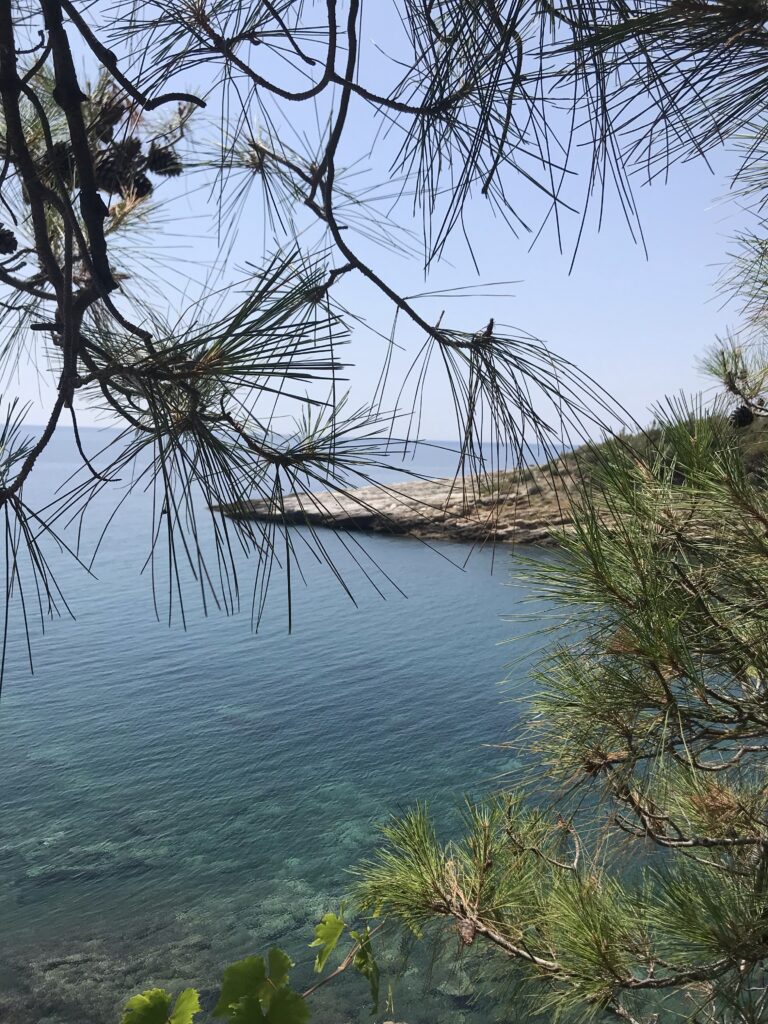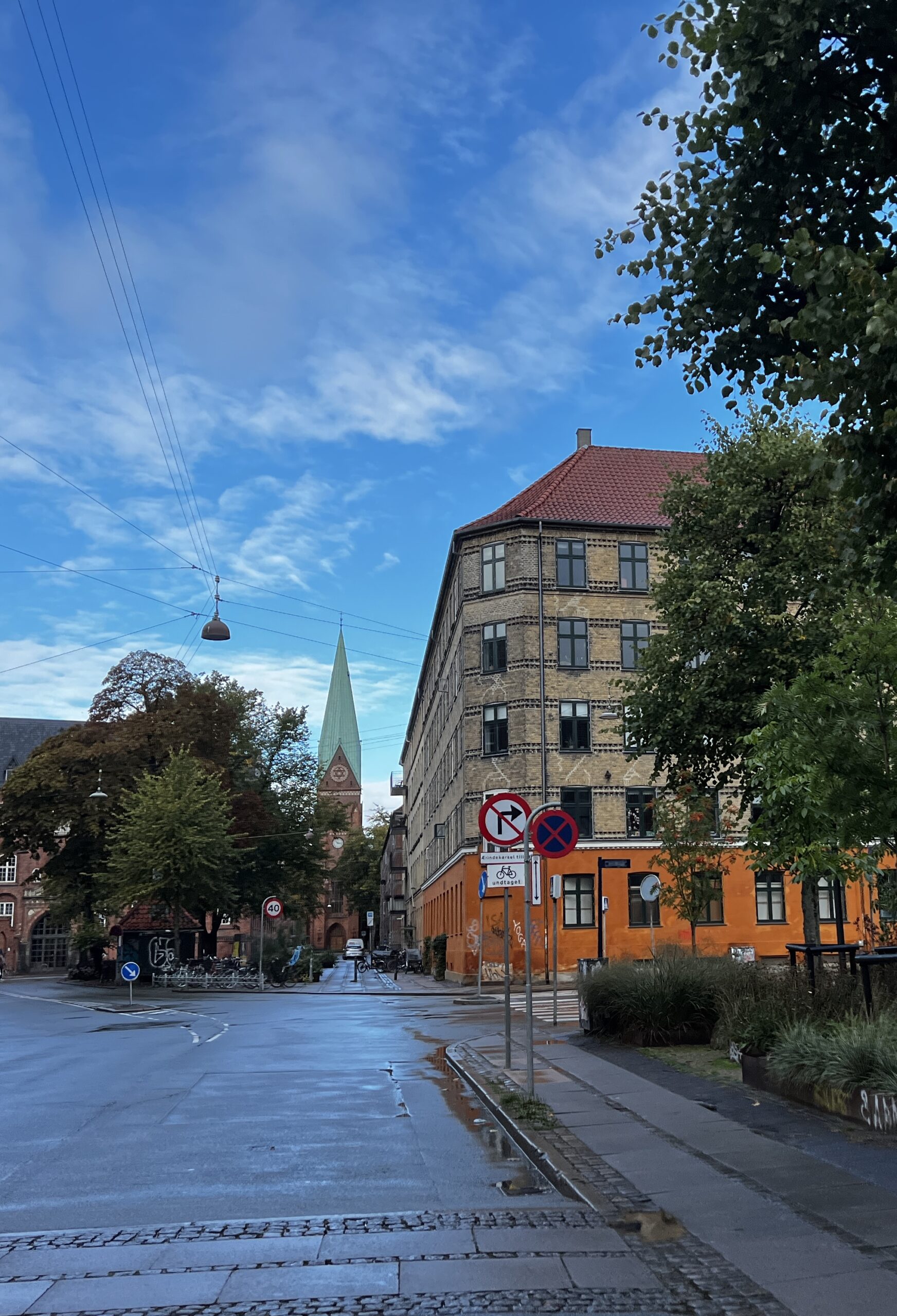
Athens, Greece
1.
Here in Ann Arbor, unable to travel, I am missing the Greek balcony, a private and public space: it’s neither in nor out but something in between. Poet Alicia E. Stallings, who lives in Athens, notes on Twitter: “Very Athenian neighbor quarrel tonight: we fired up the grill in the yard to pretend like it was a Friday, but it turns out lady upstairs had just done her laundry. Words were had.” (It was indeed Friday, but what is Friday anymore, anyway?) When I write her about this, laughing, she adds that the woman also menacingly suggests she might water her plants while Alicia’s husband works on his laptop below.
In the early weeks of quarantine, from balconies in Athens, friends filmed videos of their neighbors clapping for health care workers. On Easter, when Athens is often eerily quiet, as many Athenians return to their home villages, say, or travel to an island, the quarantined city’s balconies shone bright with candles.
In his recent essay “Who Will We Be This Time Next Year,” Andre Aciman writes of Milan and Paris, when they were cooped up in self-isolation: “People are singing from their balconies—a show of hearty solidarity and fortitude,” yet another experience of the balcony as both individual and collective.
But he amends it in a way that feels far more true: “Actually, they are wailing.”
This acknowledgment of mourning, and a collective one to boot, feels deeply moving and true. They are wailing.
In literature, balconies are often places of knowing and not knowing, of inklings, of secrets, of in-betweens. Of escapes, of entrapment. And on a balcony, nothing is truly private, and try as you might you can’t control what your neighbors do. There might be an intended audience of one but an inadvertent audience of many.
“History and stories are written, and they are written from the balcony of the present,” writes Elena Ferrante, “looking out on the electrical storm of the past.” She does not mean it literally, but I take it as such. From my balcony on Thasos, the island where I teach, I can see the ancient archaeological site with its two basilicas, the ancient ruins of the marble quarry, partially submerged by the sea. The electrical storm of the past makes my nightly dreams here eerie and alive.
Early-early, I descend the woodsy path for my morning swim, and from the water I can see my balcony. Looking up from there in the sea feels uncanny, as if another me might appear, folding her laundry, all these fragmented, in-between selves still loose, ungathered.
Some mornings, I wake to the sounds of tourists who’ve stayed up all night long, drunk and joyfully shouting. Other times the cicadas keening is deafening—they’re keening because they’re dying—or the sea is too loud to hear anything at all.
For me, returning to Greece marks the boundaries between seasons, between academic years. It’s always to return but never to stay. And I am always returning. Even now, I am in Athens, looking out at the orange trees, listening to the sounds and spats of communal living, the roar of motorbikes below. I am on a balcony in the Aegean, having a nightcap to the sound of the waves. As Joseph Brodsky writes: “a wave hitting the shore at midnight. That, to me, is time coming out of water.”
When I’m in Greece, I periodically move out to the balcony to think, both part of the world and outside it, observer and participant, as if this in-between space will help translate ideas into language. Ferrante likens the past to an electrical storm, unstable, and though I find relief and wisdom in this rejection of nostalgia, it seems the lightning keeps striking in the same places, and I can’t help but think of the instability of the future as well. “Who will we be this time next year,” Aciman asks. My friend Sugi, in a text, asks it more pointedly: “How will we mourn this?”
More than sites of solidarity, the balconies are sites of lament, and how fitting—both the balcony and the lament are liminal, in-between spaces. A movement from a wail to a word. A carrying over. What is a lament but a public translation of something private? In Greece, a dwindling trade of professional female mourners—the moirologistres—can perform grief for you, a performance meant to soothe not only the bereaved but also the deceased—for the former, their grief is performed when they cannot themselves perform it, while also helping to usher the dead into this new, bodyless state. Earlier in the pandemic, as we neared one hundred thousand deaths, the New York Times published one thousand names—naming as a kind of lament. Only one percent of the total. Incalculable, they said, and though I think they’ve been wrong lately on many things, on this they’re right.
Cultural anthropologist C. Nadia Seremetakis notes that when the call of lament is not heard, that is, a death is not met with the proper community participation, it’s a silent death, a bad death. It is “unscreamed.” Today I read Jesmyn Ward’s tremendous piece about the loss of her beloved to what she thought, in January, was the flu. A month or two later, as the Covid-19 pandemic devastated the world, she and her two children were plagued with grief. “Even in a pandemic, even in grief, I found myself commanded to amplify the voices of the dead that sing to me, from their boat to my boat, on the sea of time.” And she witnessed the Black Lives Matter protests that were organized around the world: “The people marched, and I had never known that there could be rivers such as this, and as protesters chanted and stomped, as they grimaced and shouted and groaned, tears burned my eyes.” She writes: “I recognized their action for what it was: witness. Even now, each day, they witness.”
4.
A protest is also a lament, a collective, performative wail both public and private that demands to be rightfully heard—a hope to transition into a new, better, space of justice and dignity. There’s a sense of power in lament, a mix of rage and grief, and to lament is to wildly express an emotion in a socially sanctioned way. It’s not only an expression of grief, but a mediation of it—and a license to express pain in a way that might otherwise be considered disruptive. Or, in some ways, to purposely disrupt as witness. The words for protest and witness in Greek are linked, after all.
In July, the conservative Greek government passed a bill to curtail protest: they will still allow them, they say, but sanction them so they don’t “disrupt” traffic. The rights of protest have been called “anachronisms.” Participation in a protest organized without police permission could lead to arrest and one-year imprisonment. Protest organizers can be held legally responsible if any violence or damage occurs—think about this burden and this responsibility. To have the police not only wanting to keep order at a protest, but to be the ones arbitrating who gets to protest, and how, is reminiscent of an earlier period of Greek history, the dictatorship that came to power by military coup and remained in power for seven years, from 1967 to 1974. If anything is anachronistic it’s this new ruling. It belongs to another time and space.
5.
The recent inclination, particularly in the U.S., on qualifying the term “protest” with “peaceful” is coded, considering the police violence that prompted them, that continues to prompt them. When we apply the word “peaceful” to protest we essentially are saying, you can mourn, but not too much. You can grieve, but not too much. Don’t let things get out of control. And underneath this usually innocuous word there’s an implication of obedience when the point of protest itself is civil disobedience. Peaceful means, don’t make me uncomfortable. What sort of peace, what sort of order, do you mean? There’s also the implication that without the word “peaceful,” the word “protest” is in itself unacceptable. Besides, what is peaceful about a scream?
Protests are responses to bad governance and unjust policies. Though they’re meant to bring about peace, the act of protest is one of in-between. It is a sort of rupture. Like the lament, the protest carries over, but there is nothing “peaceful” about either; there is nothing peaceful about grief. It is by definition a disruption, and there’s nothing anachronistic about it.
In her essay “Bodies of Water,” Jenna Brader writes of the “disposable class” of Chileans created by Pinochet’s “disappeared” and the way the country’s surviving family members are condemned to exist in “a kind of liminal state, an open grave of mourning.” The protests are laments and the laments are demands and to not allow these laments, to govern them, is a form of dehumanization—your losses are not important, your losses are not visible. Here in the U.S., that open grave of mourning, this grieving limbo, will stay open if the system is not changed, and radically.
Who will we be this time next year? We remain in limbo. Not speaking of injustice and grief doesn’t make it go away. We remain on the balcony of the present, waiting.
Natalie Bakopoulos is the author of two novels: The Green Shore (Simon & Schuster, 2012) and the recently published Scorpionfish (Tin House, 2020). Her work has appeared in Tin House, VQR, The Iowa Review, The NewYork Times, Granta, Ploughshares, Kenyon Review, The Mississippi Review, O.Henry Prize Stories, and various other publications. She received her MFA from the University of Michigan, has received fellowships from the Sozopol Fiction Seminars and the Camargo and MacDowell foundations, and was a Fulbright scholar in Athens, Greece. She’s an assistant professor at Wayne State University in Detroit and also a faculty member of Writing Workshops in Greece.




